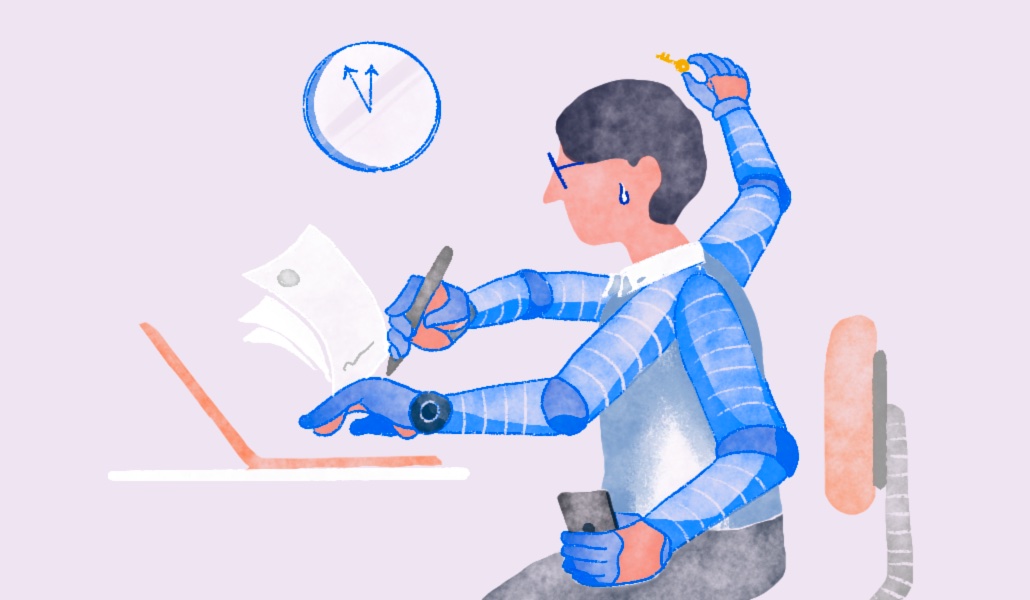How the AI boom could influence wage growth

Picture this: your company is leveraging AI tools so that your repetitive, mundane tasks that used to take 10 to 20 hours a week can be automated and be done in no time. That means you have more time to complete complex, thought-provoking assignments.
It sounds like a win for the employee who doesn’t need to get swamped with time-consuming, repetitive administrative tasks anymore. In some ways, it is – this individual can contribute in new ways, which can ultimately accelerate their career. But, will this person get paid more for doing harder work?
Experts say it’s unlikely – certainly not in the immediate future – unless that individual can make a clear case for having a pay raise.
On the flip side, if the employer decides to automate so much of one person’s job, that worker might even see their employment change from full-time to part-time. We’ve busted the myth that AI will leave people with no jobs, but these other changes are something to consider.
“As much as we don’t want to talk about it, we have to consider that as a risk,” said Cliff Jurkiewicz, vp of global strategy and general manager of the customer advisory board at Phenom. “And people don’t want to be paid less, or even the same, if they’re learning a more advanced skill.”
The backdrop of this AI boom is an economy that continues to look grim, with layoffs happening across industries at the start of 2024, leaving people to really question their jobs and salaries. New data from executive coaching organization Vistage, which surveyed 1,300 U.S. companies, found that 23% of CEOs report they will be giving smaller pay raises than they did in 2023, and 4% said they don’t plan to give raises at all this year.
According to WTW, which advises companies on compensation issues, employers plan to offer an average salary increase of 4% in 2024. That figure is slightly lower than in 2023, when raises averaged 4.4%. At the end of 2023, ADP also reported the slowest rate (5.6%) of wage growth in over two years. Those who changed jobs saw wage increases of 8.3%, making the premium for switching positions the lowest since ADP began tracking the data three years ago.
That’s why workplace leaders say it’s important for employees to understand how AI will impact their wage growth and to understand how to talk to their employers about it.
The long history of job evolution
“The role of technology for centuries has been to displace existing jobs with new ones for a future economy,” said Thomas Kunjappu, CEO and co-founder at employee experience platform Cleary.
It’s true. Letters have been replaced with emails and phone calls, horse and carriage have been replaced with energy-efficient cars, and checks have been replaced with credit cards. And in most scenarios, people ended up with higher-paying jobs and better opportunities.
It’s something Kunjappu sees himself with customers who use Cleary. “We are now seeing automation enable folks to work on higher-level tasks,” said Kunjappu. “Think sending emails manually and following up manually with managers … to now ensuring the experience is smooth by just looking at a dashboard.”
It frees up folks to work on different responsibilities due to the efficiency of automation. Kunjappu says that folks who are mastering these new tools represent the future, and some are even seeing the payoff too. For example, one customer, who preferred to remain anonymous, was recently promoted to a full-time role in internal communications thanks to busy work being automated.
Double-edged sword
While it can help people grow in their fields, it might be too big of a learning curve for others, which would widen the gap between who is and isn’t climbing the corporate ladder.
“If a person possesses AI knowledge and skills, the chance to secure a good paying job would be higher than those without such knowledge and skills,” said Kirk Chang, organizational behavior and human resource management, University of East London, England.
But not everyone has access to the education of AI skills, similar to how not everyone has access to college. If someone can’t learn these new skills, it could potentially set them back more than it might spring the person who does have the skills ahead.
“We should not link the application of AI to wage growth unless those influencing factors are rectified,” said Chang. “Workplace ethics and equality must be exercised in advance of AI application and, more importantly, AI should not become a loophole in getting financial advantages.”
Chang argues that what matters more than knowing AI is someone’s willingness to learn and their employability. He says that’s what will be influential in how a person grows within an organization. Similarly, Zack Kass, who is a former OpenAI executive, thinks that most employees are going to be more focused on finding purpose within their jobs than they will be thinking about how their role might relate to AI and if they can get paid more.
“In every industrial revolution, there has been a net increase of 50% or more jobs,” said Kass. “The problem we are facing isn’t with respect to job loss, but identity loss. The same thing is going to be true with wage growth. People aren’t going to feel like they need more money, but they will need more purpose.”
When people realize that their jobs are changing, they will need to double down on ensuring that they are resilient to a future in which jobs change as quickly as technology does.
“If you’re a knowledge worker, the most interesting thing you can do is get really good at being human,” said Kass. “It’s increasingly complicated to index your life on a skill. You can’t really say ‘hey, you’re automating work that I went to grad school for, you need to pay me more.’ It’s the qualities that define you as human that will set you apart.”
But not everyone agrees. Kevin Green, president and CMO of revenue intelligence platform Truent.ai, said that “the investment in people who understand not just the technology, but the entire AI ecosystem is critical.”
“The race for top talent has been going on for the past few years and only continues to accelerate,” he said. “In the near term, finding people with the right skills to not only implement AI, but operationalize it across the business will result in wage increases.”
Employees need to be their own advocates
For Jurkiewicz, what matters most is that employees understand the potential risk of either doing more work for the same pay, or having hours reduced to part-time or contract work. While we aren’t completely there yet, he encourages workers to understand that it could happen and he has advice on how to be mindful of the impact AI has on everyone’s job.
For him, it’s saying to your manager: “I deserve more because I’m bringing a highly valuable skill that didn’t exist in my job before or only existed during a fraction of my time.”
“We need to train people how to negotiate for themselves,” said Jurkiewicz. “It’s not ‘pay me less or cut my hours,’ it’s ‘how do I create more value for the organization and how can I reap more reward.’”
A significant part of that is on the employer to map out how it plans to support people and where it encourages the use of AI tools to create efficiencies. Jurkiewicz says it can even become a part of performance reviews.
“Initiate it as a manager and leader,” said Jurkiewicz. “Ask what are your thoughts on generative AI and the work you’re doing. It’s a much more positive conversation around AI.”
On the individual level, it’s important to also do a personal AI audit to see how you can make your own workflow more seamless. It’s figuring out what tasks you don’t want to do anymore, what you can transfer, what tools can help, and so on. Doing that can help show that you are invaluable to the organization.
“How do you take these innovative technologies and use them to leverage teaching and training as upskilling,” said Jurkiewicz. “There’s a whole conversation that has to be had around using generative AI to upskill your workforce versus using generative AI to replace your workforce.”


